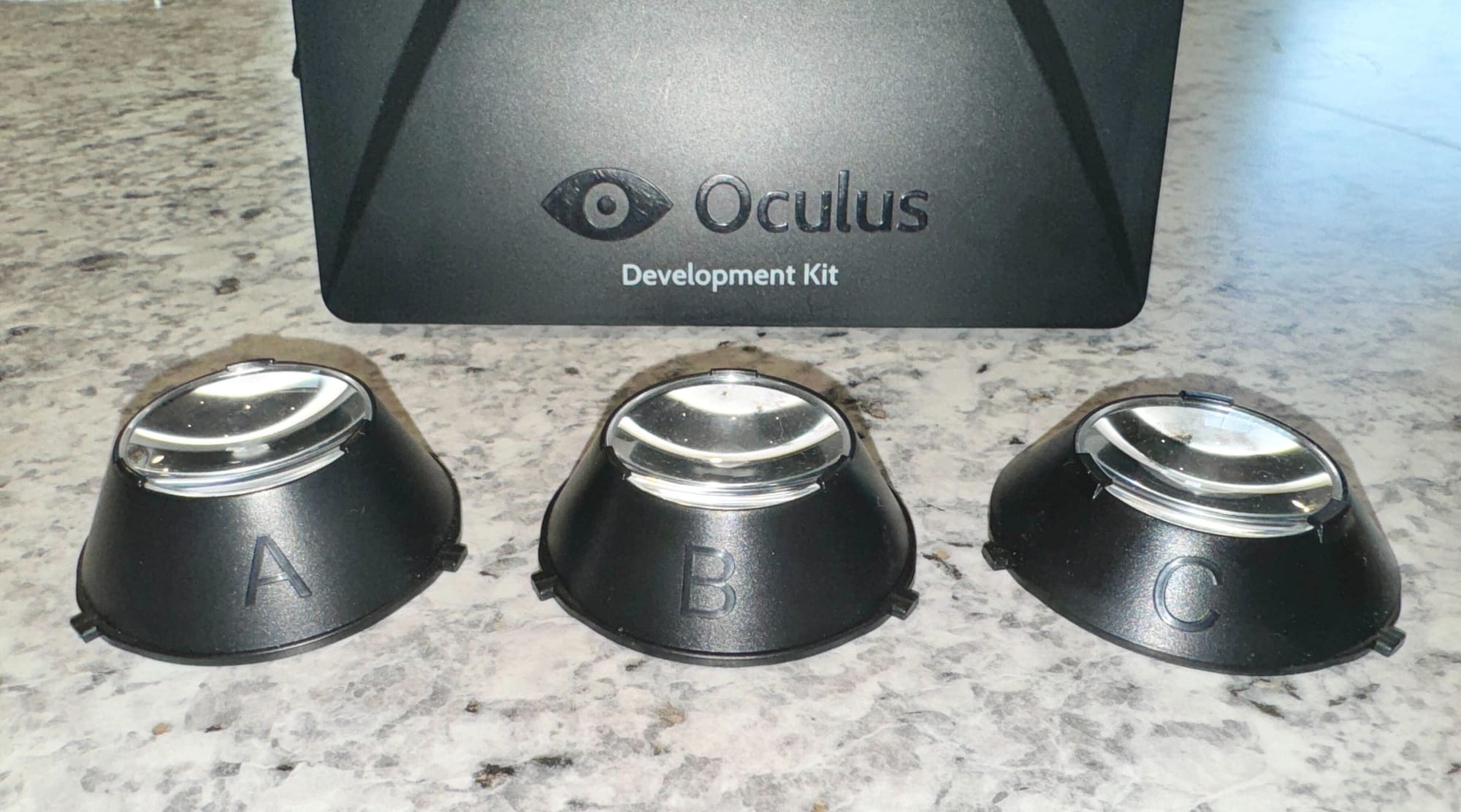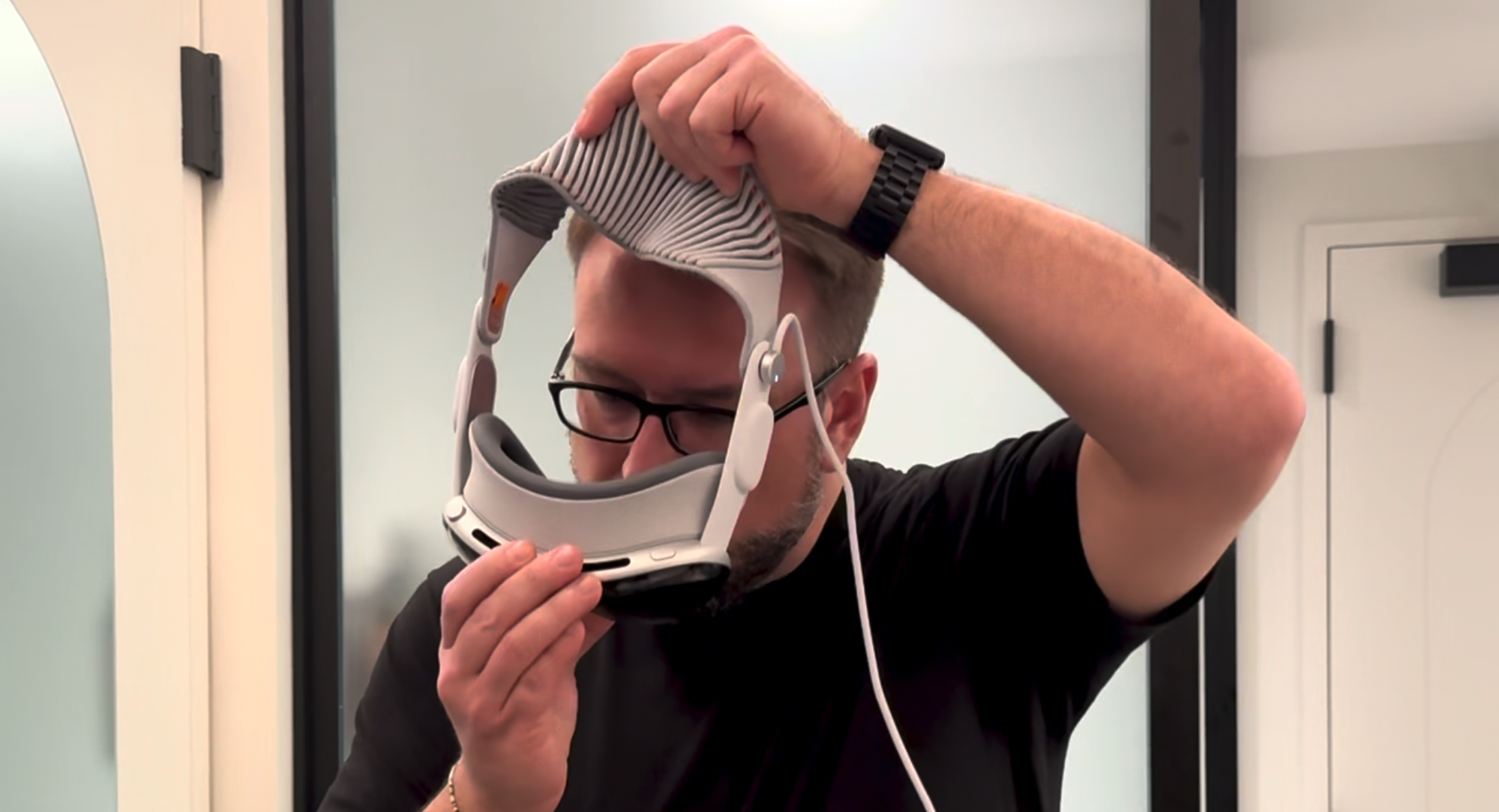Despite Apple’s insistence that I do not wear Apple Vision Pro with my prescription glasses, I wanted to know if I could, so I could determine if I should.
Most people will wear corrective lenses over the course of their lives and estimates of the addressable market range from the hundreds of millions in the United States to billions globally. I’ve been a bespectacled individual for a very long time, and back when I bought the Oculus Rift DK1 in 2013, it was arguably the only player in the game in terms of consumer level VR hardware. That headset came packaged with three sets of interchangeable aspherical lenses offering varying degrees of vision correction.

I personally found the Rift DK1 “C” lenses provided me with a somewhat clear view, although the combination of the “A” lenses and my own prescription glasses jammed into the headset worked best for me. Sure, I was sacrificing a bit of the field of view due to the distance from my eyes to the screen, but a diminished FOV was something I had dealt with in the real world since I got my first set of prescription glasses at age 6.
As consumer headsets started to evolve, the option for interchangeable lenses disappeared. This left me with the only option of wearing my own prescription specs while traversing the metaverse. I even purchased smaller Harry Potter style frames to better accommodate the snug fit of the headsets.
I’ve had mixed results over the years. Some headsets like the Oculus Go and original PSVR seemed to be built specifically to handle glasses of many shapes and sizes due to its roomy face box size. Twice, I had a pair of glasses that ended up with scratched lenses due to the tight squeeze and the rubbing together of the two sets of lenses.
I’ve never once scratched a headset lens…yet. I’ve lost so much time to smudges, though. My prescription glasses, forced to smush against my eyelashes, need to be cleaned after every VR session.
It’s now 2024, and both Meta and Amazon are members of the Vision Council, a group whose members “produce 90 percent of the prescription lenses worn in the U.S.”. The organization estimates that, as of 2023, 80% of adults in the United States (over 200 million people) use some form of vision correction, including reading glasses, prescription glasses, prescription sunglasses, or prescription contacts. Logically, any company manufacturing something to wear over the eyes must either accommodate prescription glasses or offer corrective lens options.
There are several companies now that offer corrective lens inserts for many of the current popular headsets. Zenni Optical, for example, makes prescription lenses for the Meta Quest 3 – that’s a $50 solution for a headset starting at $500.
Now we get to the Apple Vision Pro.
Apple Vision Pro & Prescriptions
I wanted to look inside a headset in the Apple Store, but was told not to use my own prescription glasses when I asked. My colleague Ian Hamilton was told the same during the demo he signed up for. Apple did, however, measure the lenses from Ian’s Meta Ray-Ban glasses to provide in-store inserts.
For purchase on top of the $3,500 headset, UploadVR and everyone else has been told that the only option is to buy the Zeiss-branded corrective lens inserts. This is Apple’s policy, and all of their documentation echoes this requirement.
When I eventually found myself alone with a Vision Pro, though, without the forbidding gaze of an Apple employee or anyone to tell me to stop, I tried the headset with my glasses on.
0:00
It seemed to work. It was a very snug fit with my current style of glasses, but I was able to get the headset on with my glasses firmly pressed against my face and the distance between my own lenses and the Vision Pro’s millimeters from collision. I watched as the green outlines inside Apple Vision Pro adjusted to my eyes and set up eye tracking. I had a reduced field of view as with every other VR headset I’d worn.
After I removed the headset, cleaned my smudged glasses, and put Vision Pro back on, I noticed that I did have to adjust everything a bit to get back into proper calibration. As has been my experience with every other headset, The Apple Vision Pro can be used while wearing my own glasses, though I didn’t use the headset long enough to see the impact of my glasses to Apple’s eye-tracked distortion correction.
Vision Pro Demos & Inevitability Of Damage
So why even bother trying this?
Apple Vision Pro isn’t a several hundred dollar headset. It’s a multi-thousand dollar headset. The gamble of scratching the lenses on such an expensive piece of hardware increases tenfold when you cram your own glasses into it. Apple’s warranty notes that it doest not apply “to damage caused by operating the Apple Product outside Apple’s published guidelines” and AppleCare+ warns it will not repair any damage caused by “abnormal or improper use”. AppleCare+ is available for the Vision Pro for $499 for two years as a supplement to the one year limited warranty. Even if AppleCare+ covered it, a repair would still cost you $299.
The Zeiss corrective inserts start at $100 and are a logical choice for your own personal device. You have to ask yourself if the costly risk of wearing your own glasses is a smarter choice than spending $150 for a pair of removable prescription inserts.
An impressive new piece of technology like the Apple Vision Pro is begging to be offered to friends and family for demos. You cannot possibly be expected to have a variety of different lens inserts to handle the corrective needs of all your bespectacled friends – even if that’s Apple’s recommended path here.
You may be tempted to remove your own personal corrective lenses and let Uncle Paul try to jam his own John Lennon style specs into your Vision Pro. We don’t recommend doing that, but we’re curious what happens when someone ends up back at the Apple Store because of a scratch on Vision Pro’s lenses.





